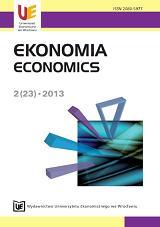Matki-menedżerki i ich powrót na rynek pracy po urodzeniu dziecka
Mothers-managers, their return to the employment market after giving birth
Author(s): Magdalena RękasSubject(s): Economy
Published by: Wydawnictwo Uniwersytetu Ekonomicznego we Wrocławiu
Keywords: family promoting policy; family model; supply factors for women’s work; professional activity; reproduction
Summary/Abstract: Disadvantageous social & demographic trends in the European Union, in particular, ageing of the society and the decrease in the reproduction, force a public debate focused on conditions which could promote linking of the professional life and the family life. One of significant elements of the family promoting policy must be employment market situation adjusted to the needs of women, who must work and face the family issues. A substantial matter for women, who are mothers, is liquidation of obstacles arising from the return of women to the employment market. Giving birth must not mean falling out of the market and the long-term unemployment. Previous efforts made in Poland have failed. Even worse, the latest data regarding the unemployment rate originating from the MPiPS (Ministry of Labor and Social Policy) show that at the end of the first half 2012, the unemployment record contained data of 211 thousands women who did not return to work after they had given birth. This is by 18 thousand more than in 2011 and by 36 thousand more compared to 2010. Moreover, in Poland, when a woman returns to work after the expiration of the maternity leave, a guarantee of getting her job back is limited (art. 1832 Labor Code); she is not protected from a dismissal. The goal of this paper is an assessment of Polish mothers-managers situation, including situation of women who run their businesses, returning to the employment market after giving birth. The results are based on own survey. To achieve the goal the impact of changes on the employment market in the twenty first century on the contemporary family model was described. A previous model, so called single breadwinner, that is a traditional family model with a man being the sole person who works, is no longer valid. Moreover, there were enumerated factors, which affect the professional activity of women-mothers, on the basis of research in the framework of the scientific project “Social Diagnosis 2000-2009”. They proved that having a baby means nearly 100% increase in the professional activity of fathers and the decrease in the professional activity of mothers by 75%. In order to achieve the goal the following methods and analysis were used: the descriptive method, comparative analysis and the critical analysis of results. The analyses were based on own studies carried out from May to July 2012. The subject of the study was a group of 263 women.
Journal: Ekonomia
- Issue Year: 2013
- Issue No: 23
- Page Range: 168-179
- Page Count: 12
- Language: Polish

